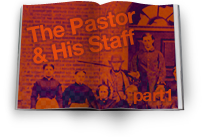The Obvious and Not-So-Obvious of Staff Management
Full disclosure: My staff may think it’s funny that I’m writing an article on wisely managing the staff. Not everyone would say that this is one of my strong suits. That said, I’ve been doing it for the better part of two decades now, and even I’ve learned a few things, if only by mistakes.
So here are some common tips, some obvious tips, and a few, perhaps, not-so-obvious tips.
COMMON TIPS
Much of staff management is simple wisdom. Read the book of Proverbs and follow it. For that matter, many secular books on management will tell us things that we should know. But let’s make sure we’re not assuming that we have all the basics down. So let me highlight four common matters:
1. Select Your Staff Carefully
First, select your staff carefully. Some people need little management. They’re the ones that I most want to hire. They are motivated self-starters, well equipped for what you’ve hired them to do, with a good track record of character, gifts, marriage, and perhaps family commending them.
However, they don’t necessarily need to be accomplished in exactly what you’re hiring them to do. Hire people with raw gifts and work to develop them.
2. Draw Clear Lines of Responsibility
Second, draw clear lines of responsibility. Conflicts and confusion will arise on any staff. Clear expectations and explicit authority will help to contain and channel conflicts, to reduce frustration, and to redirect such unexpected “energies.”
3. Have Fun with Your Staff
Third, have fun with your staff. Enjoy them and let them enjoy you. You are probably part of the reason that they are there. You help to motivate them by giving them time and attention.
4. Give Them Honest Feedback
Fourth, give them honest feedback. This will come as no shock, but the temptation for at least some pastors (me included!) will be to manage the staff’s affection for us more than managing them for their own good. Sometimes caring for them well will mean giving them clear critique, while still affirming their overall sense of direction in ministry.
OBVIOUS TIPS
Caring for the pastoral staff also means pastoring them. Remember that the people on your staff are more fundamentally Christians than they are members of your church, and that they are more fundamentally members of your church than they are members of your staff. Love them. While you will have to evaluate them in their work, care even more about them as fellow disciples of Christ. You want them to spiritually prosper during their years under your immediate care and leadership.
Some of these ways of caring for pastoral staff are more obvious, others less so. Let me begin with the more apparent ways. I’ll mention five.
1. Pray for Them
First, pray for them. In a well-staffed church, praying for those who serve the church in this special way is time well spent. Pray for their personal walk with the Lord, their friends and family, and their own ministry, as well as their job. Never allow “professionalism” to obscure your responsibility in this area.
2. Model, Instruct, and Teach
Second, model, instruct, and teach. Show them what it means to be a pastor. Let them see things you are struggling with, and that you are uncertain about. Also let them see and ask questions about decisions you make. Don’t be slow to explain. Repeat yourself. Remember Paul’s words in Philippians 3:1: “It is no trouble for me to write the same things to you again, and it is a safeguard for you.” Realize that one of your roles is teaching them.
3. Trust and Delegate
Third, trust and delegate. You get more things done by getting more people to do things. Staff cuts up ministry in bite-size bits for others to be able to handle. And that means that one of the chief ways you can build up a local congregation is by handing off more and more duties to others. Some things are at the core of your role as senior pastor. But many things can be handed to others.
We should lead the staff to be enablers and facilitators of the ministry of others, rather than doing it all ourselves. To the degree you are able to be a leader of ministers, you will be able to draw around you quality leaders in their own right. Don’t wait for these folks to earn your trust, but extend them trust and set up contexts in which they can spend it, confirm it (in your eyes and the congregation’s) and spend more. Help to make them a success by giving them opportunities to teach and lead the congregation well.
4. Forgive Quickly
Fourth, forgive quickly. Other people make mistakes as much as I do. Therefore, I must exemplify the same kindness and mercy to others as I myself have known from God, my family, and my congregation. Any “scores kept” must only be for the good of the staff member or the congregation. Personally, you should have pure and unhindered affections for those who work with you.
5. Encourage Them
Fifth, encourage them. When Paul began his letters, he often commended God’s work in the Christians he was writing to. In doing this, he both acknowledged thanks to them, and at the same time exemplified being a student of God’s kindnesses in life. So in terms of your staff, pastor, never flatter them, but regularly cherish God’s work in and through them. Be openly grateful. Make generously acknowledging and thanking others normal among your church staff. God has been at work in them, and you should be one of God’s chief students in their lives, noting his work and drawing others’ attention to it.
MAYBE NOT-SO-OBVIOUS TIPS
All of the above are fairly obvious observations. So I could forgive you for skimming the article and coming down here to find what I would consider less obvious ways that you should pastor your staff. Let me mention five.
1. Care for their Wives
First, care for their wives. If the pastors who work around you face the same kind of challenges that you face, they will find themselves pressed. For your married staff, that will inevitably mean that some pressures fall upon their wives. The senior pastor is in a unique role to make sure that family times are encouraged, and that sufficient money is provided to care for them. If this is not done, the staff member’s job can begin to make their spouse feel that the church is a problem, even their adversary. And that can leave a bitter legacy for a lifetime. Do not alienate the affections of the wives of your fellow elders and pastors. Making sure the church cares well for staff families is one of the best ways you can work to build up your local church, and other churches they may serve.
2. Build the Team
Second, build the team. I only say that this is less obvious because sometimes we tend to think of pastoring as a fairly individual thing—one pastor caring for one other person. But if we’re going to have several folks working with us, building a team will help them in ways that we could never plan. The team can make up for my mistakes; help each other to heal up after bruises, mistakes and afflictions; and care for, encourage, challenge, and spur each other on. The team can multiply the effects of your pastoring. Staff meetings can be times not of one-way communication from you to them, but of you facilitating a conversation together. Encouraging people to take initiative and responsibility will prepare them for whatever God is calling them to do now and later.
3. Humble Yourself to Receive Direction from Others, Even to the Point of Inviting Criticism
Third, humble yourself to receive direction from others, even to the point of inviting criticism. I have established regular times in our weekly or monthly calendar for giving staff the opportunities to give and feedback on everything from my preaching and song selection to pastoral care and weighing in on speaking invitations. It’s both good for me to do this and good for other leaders to see me doing this. Humility for me as a senior pastor means realizing everything that I am not, realizing what gifts I don’t have. Knowing the truth about my own limitations helps me to know what staff we need to hire. And it also helps me to trust them, even as I solicit ideas from them about how I can better minister God’s Word.
4. Be Willing to Take a Bullet for the Good of Others, and for the Health of the Staff as a Whole
Fourth, be willing to take a bullet for the good of others, and for the health of the staff as a whole. If there’s a bullet to be taken, often it’s the senior pastor who should take it. If a decision you approved has met with the opposition of another staff member, throw your weight behind it or else reconsider it entirely. But either way, make it clear that the person who made the decision was acting with your approval. While it’s not always the case, the senior pastor will often have more credit with other staff and with members. We’ve got more to spend. So if it’s helpful for the direction of the church, or the good of office inter-relations, we should be happy to let our credit be spent. We have it to use it, brothers! My flesh too often avoids this, but I know it’s right, and I pray that I would do it better, and more.
5. Note their Strengths and Make Allowances for their Weaknesses
Fifth, note their strengths and make allowances for their weaknesses. You have strengths, and you need people to see those strengths and encourage you in them. You also have weaknesses, permanent limps that, no matter how hard you try, just don’t seem to go away. And you need people to be gracious with your limps, whatever they are, and not define you by them. Now, do the same for your staff members. Be the guy in their life who always seems to see their best. That doesn’t mean you’re a pushover, letting sluggards be sluggards. But it does mean you’re the first to rejoice over the gifts God has uniquely given them. It also means you show understanding when they cannot always keep pace with others, whether intellectually, physically, or otherwise.
STEWARD YOUR STAFF WELL
Finally, appreciate how important it is to manage your staff well. As my brother Garrett Kell reminds me, we’re not in competition with our staff. If God has entrusted you with gifted team members, we want to encourage them. They are gifts of Christ to his church. Cherish them.
Remember, pastor, when you’re looking at your younger staff members, you’re looking at the future of the church. Praise God that he gives us teams to work with, and that, for a season, he allows us to pastor others whom he’s calling to be pastors. Whether it’s such future pastors, or other staff members that God commits to your care, thank him for this stewardship and “discharge all the duties of your ministry,” even—especially—to those around you on staff.









